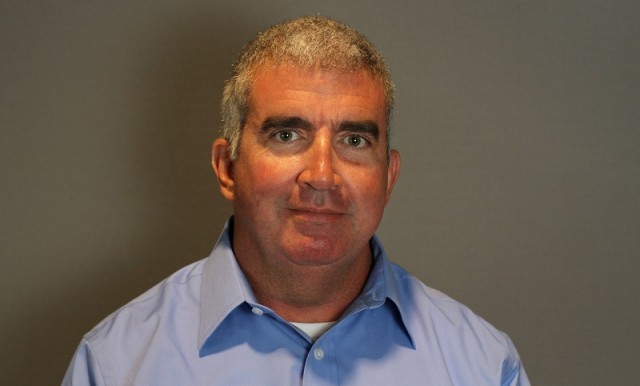At Johnson & Wales University Online, our classes are taught by skilled professionals who have real-life work experience. Our MS – Criminal Justice program is no exception. One of our professors — Murray Widener, DPA — is a seasoned law enforcement veteran and academic scholar who brings life-like scenarios into the online classroom.
Born in Columbus, Georgia, Widener earned his bachelor’s degree in Criminal Justice and Master of Public Administration from Columbus State University. He then received his Doctorate in Public Administration from the University of Alabama in 2005. Not only does he have 14 years of experience as a police officer, but he currently serves as the Assistant Recruit Coordinator for the Columbus Police Department. A certified POST firearms instructor, Widener is also a state/NAMI certified Crisis Intervention Team Instructor. Plus, he’s a Yoshukai Karate black belt.
Here’s what you need to know about Professor Widener:
How did you come to teach online at JWU?
I initially began at JWU as a subject matter expert to develop a new budgeting course for the Public Administration program. Later, I developed a criminal justice technology course and, from that relationship, was asked to teach the class I had developed. Since that time, my association with JWU has grown, and I now help with updating, revising, and building curriculum in the criminal justice program. I also teach regularly for the university.
What did you discover about online learning during your first online teaching experience?
My first online teaching experience was in October of 2002. This was in the infancy of the online revolution. In that first term, I realized that teaching and learning online was not the cakewalk many thought it was. As a student, there is much more hands-on work to complete, and it is not possible to sit in the back of class, take the midterm and final, complete the term paper, and simply get your grade.
In the online environment, the student must self-motivate to engage in the weekly discussions, the assignments, the projects (yes, even the occasional group project), and interact with the other students to enhance the learning environment. The one thing that struck me was that there was far more work for the student and the instructor in an online course. The other revelation was that the student was no longer bound to a particular time on a particular day to get their education. They could now receive an education and earn their degree anytime, anywhere!
How does your industry background help you educate future criminal justice leaders?
I am a bit of a unique creature. Most people in the criminal justice field are either a practitioner or a scholar. There are some who were once practitioners who, over time, obtained a doctorate and turned to teaching. Then, there is me — I was a practitioner, gained my doctorate from the University of Alabama, taught full-time at a regionally accredited university for over 10 years, and then returned to being a practitioner while still teaching as an adjunct. I maintain a balance and exceptional insight into the criminal justice field by my experience as a practitioner and a scholar. Now, I’m part of both worlds at the same time.
What excites you about the industry today?
The part of criminal justice that, at this moment, both excites and fills me with apprehension is the current conflict between the criminal justice system and some parts of our society. The apprehension comes from the danger and open hostility coming from those who feel oppressed by the system. The excitement comes from the fact that this is our opportunity to address the issues that have caused this conflict and resentment. I do not believe we in criminal justice should hide from the conflict or simply wait for the anger to abate. Communication and education are the keys to remedying much of the anger and distrust so apparent in the events in recent history. We are obligated to address these issues head on.
What would someone be surprised to learn about you?
I am very tenderhearted about some things, like children — especially my children. Also, the movie that makes me cry every year is The Muppet Christmas Carol.
What do you do in your free time?
I enjoy fishing, camping, working out, and spending time outdoors — anything outside with my two boys.
What’s your best piece of advice for a student hoping to work in the criminal justice field?
All careers in the criminal justice field are a calling, not a choice. The pay and the difficulties of the field are such that if all you want is a paycheck and good hours, you need to look elsewhere. If you are looking to be a part of the solution, a piece on the chessboard, instead of just another fish in the pond, then this is the field for you.
If you’re looking to pursue your Master of Science – Criminal Justice online with Murray Widener, fill out the “Request Info” form on this page or call 855-JWU-1881. You can also email us at [email protected].
